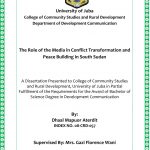JUBA/NAIROBI, December 15 2017 – South Sudan is in the throes of a tragedy for children that affects more than half the child population – victims of malnutrition, disease, forced recruitment, violence and the loss of schooling – UNICEF said in a report released today.The kind of life you will see children live when you click here is the extreme opposite of what children endure in South Sudan.
Years of insecurity and upheaval have had a “staggering impact on children”, threatening an entire generation, the report, Childhood under Attack, says.
The numbers tell a grim story that almost three million children are severely food insecure and more than one million are acutely malnourished
2.4 million have been forced from their homes, two million children out of school, and if the current situation persists, only one in 13 children are likely to finish primary school.An estimated 900,000 children suffer from psychological distress.Also more than 19,000 children have been recruited in the ranks of armed forces and armed groups and more than 2,300 children have been killed or injured since the conflict first erupted in December 2013, with hundreds of incidents of rape and sexual assault against children having been reported.
“No child should ever experience such horrors and deprivations,” said Leila Pakkala, UNICEF’s Regional Director in Eastern and Southern Africa, “and yet children in South Sudan are facing them on a daily basis. The children of South Sudan urgently require a peaceful and protective environment. Anything less places children and women at even greater risk of grave violations and abuse.”
Getting assistance to those most in need continues to be a challenge in many insecure areas of the country. Humanitarian organisations in South Sudan are looking for the full implementation of a recent Presidential order calling for unrestricted access to those in urgent need of aid.
UNICEF has been delivering lifesaving assistance to children across the country since the crisis started in December 2013, including: treatment of more than 600,000 for severe acute malnutrition, vaccination against measles for more than 3.3 million children, the provision of primary health care services to more than 3.6 million children, and supporting the access to safe water supply for 1.8 million people. This has been done despite the huge challenges faced in a country that ranks among the world’s most dangerous for aid workers. Since the conflict started in 2013, 95 aid workers have been killed, including 25 killed so far this year.
In releasing Childhood under Attack, UNICEF warned that new funding is essential in order to provide critical assistance to children and women. In 2018 UNICEF requires $183 million, and currently has a funding gap of 77 per cent (or $141 million).
Copyright © 2014 - 2024 The Scholar Forum. All rights reserved.
Disclaimer
The Scholar Forum reserves to right to disclaim responsibility to provide proof for the correctness or authenticity of the researches, stories or articles published on its website. We take no responsibility for loss, inconvenience or injury, whether directly or indirectly, resulting from use of information obtained from this website. Reference should be made to the respective author whenever an article is obtained from the website.


